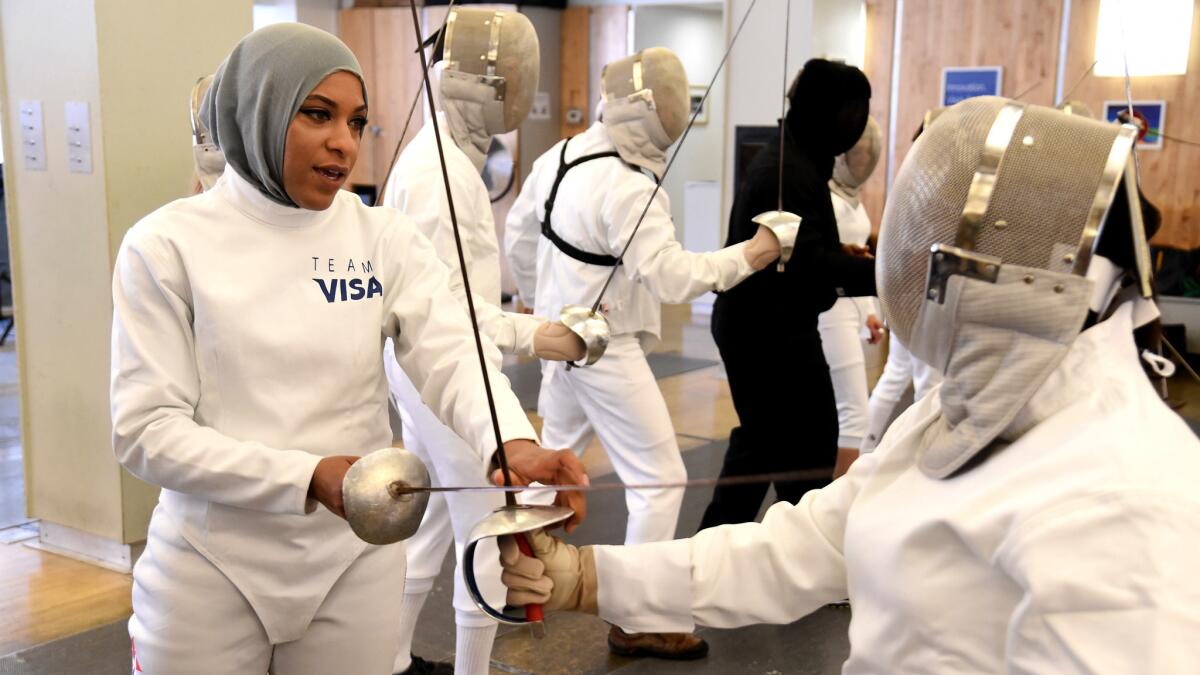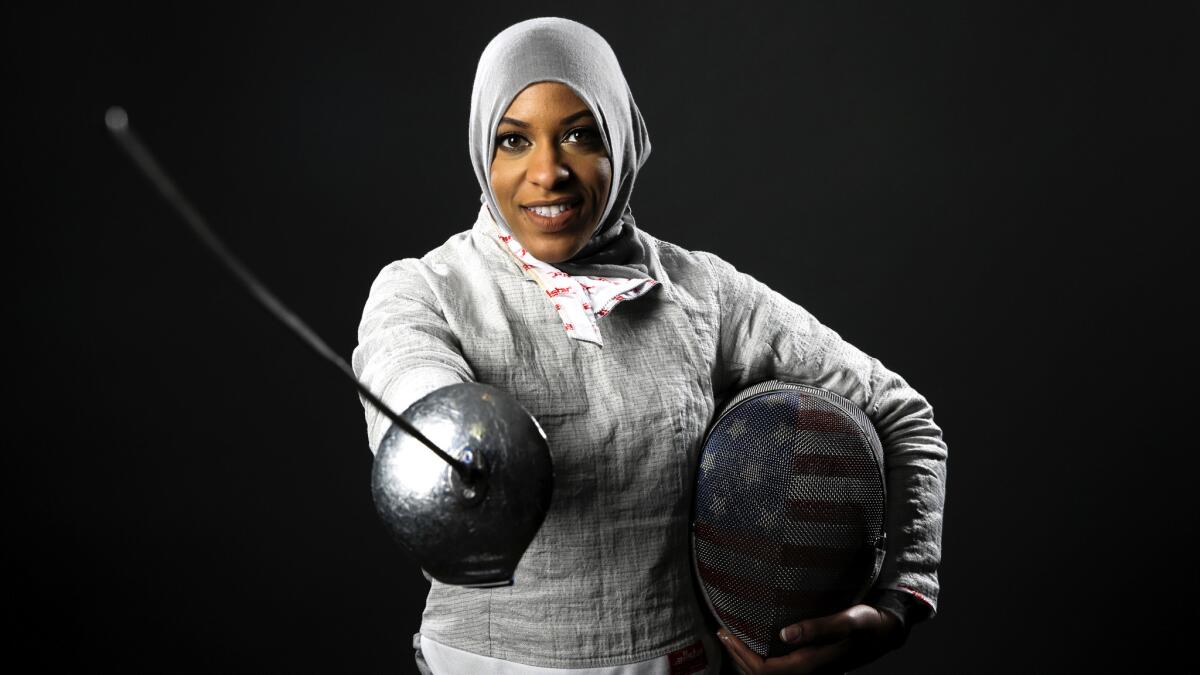Fencer Ibtihaj Muhammad is about to make U.S. Olympic history

- Share via
Reporters crowd around Ibtihaj Muhammad for the better part of an hour, standing two and three deep, pushing close, a jostling mass of cameras, lights and microphones.
Her smile remains steady, her voice measured as she faces question after question.
“I have a very short window as an athlete,” she says. “And I’m going to try to take advantage.”
Muhammad ranks among the top fencers in the world, but that isn’t what the media asks her about.
When the 2016 Summer Olympics begin in Rio de Janeiro, the 30-year-old Muslim will become the first American woman to compete in the Games wearing a traditional headscarf known as a hijab.
At a time of terrorist attacks worldwide and Donald Trump calling for a ban on Muslim immigration, Muhammad’s religion has made her a lightning rod for attention.
Television news crews have followed her through training and President Obama singled her out at a recent event in Baltimore. Time magazine listed her among the 100 most influential people of the year.
Normally a private person, Muhammad has made a point of speaking openly about her life in ways that reach beyond sport.
“It’s a tough political environment we’re in right now,” she told the media at a U.S. Olympic Committee summit in Los Angeles. “Muslims are under the microscope.”
Across the room, Alexander Massialas — the top foil fencer in the world — looks at all the reporters surrounding his teammate and shakes his head.
“It has to be tough, but she’s handling it extremely well,” he says. “She’s never been one to shy away from a fight.”
::
A half-dozen female athletes wore hijabs at the 2012 London Olympics. The international soccer federation lifted its ban on headscarves in 2014 and basketball followed a year later.
“A step in the right direction,” Muhammad says.
Growing up in New Jersey, one of five kids raised by a father who was a narcotics detective and a mother who taught school, she learned early that appearances make a difference.
A competitive nature led her to sports, but she often felt awkward playing volleyball or running track with her head covered, a uniform pulled over the top of sweat pants and long sleeves.
“I would get stares,” she says. “My skin color, my religion, made other people uncomfortable.”
Riding in the car one day, stopped at a red light, she and her mother glanced at a school building and could see through the windows to where kids practiced an unfamiliar sport in jackets, pants and masks.
“Fencing found me,” Muhammad says. “I wanted a sport where I could be fully covered and I didn’t have to look different.”
An initial try at epee — which can be slower-paced — proved less than satisfying. She switched to the explosive, clanging action of saber.
“I had to be faster on my feet,” she says. “I enjoyed that.”
Quickness and determination fueled her climb up the ranks. Muhammad was on her way to winning state championships in high school and competing for Duke, where she was a three-time All-American while earning degrees in international relations and African studies with a minor in Arabic.
After graduation, she continued fencing with the national program.
We come in all different shapes, colors and sizes and we come from different backgrounds and we’re productive members of society.
— Ibtihaj Muhammad says of Muslin women

“I’ve known her since we were young,” says Daryl Homer, an Olympic teammate who met Muhammad at the Peter Westbrook Foundation, a New York organization that introduces inner-city youth to the sport. “It’s amazing to see the transformation she has made.”
::
Qualifying for the Games can be nerve-racking under the best of circumstances.
As Muhammad chased a spot on the U.S. team, the attacks in Paris and San Bernardino made nightly news and Trump proposed “a total and complete shutdown” of Muslims entering the country. American mosques were being vandalized and Muslim passengers kicked off commercial airlines.
“That was always one of my concerns,” Muhammad says. “Am I going to be allowed to board my flight to make it to my Olympic qualifier?”
The fencing strip was one place where she could shut it all out, putting together a string of podium finishes on the World Cup circuit this winter to secure her spot in Rio.
At that point, she could have chosen to lay low, avoiding distractions, but it wasn’t in her nature.
“For as long as I’ve known her,” Massialas says, “she’s always had an opinion on something.”
Sensing an opportunity to inform the national debate, Muhammad took to social media and appeared on network news, “The Today Show” and “The Ellen DeGeneres Show” to tell her story.
Obama invited her to that meeting with Muslims, where he challenged her to win gold, adding: “Not to put any pressure on you.” Two months later, she gave Michelle Obama a fencing lesson during a USOC event.
Her public comments were always straightforward — nothing melodramatic. Still, she drew heat.
In April, Muhammad tweeted about a man who followed her down the street, asking if she was going to blow something up. Invited to speak at the South by Southwest festival a month later, she was told to remove her hijab for an accreditation photo. Festival officials later apologized.
She became a target online.
“I just delete them before I can finish reading them,” she says.
Muhammad has kept herself in the public eye for two reasons.
First, she wants to set an example for a Muslim community that, she believes, could do more to encourage girls in sport. Second, she says, “I’m hoping to change the image that people may have of Muslim women.”
“We come in all different shapes, colors and sizes and we come from different backgrounds and we’re productive members of society,” she says. “I want people to see we can even be Olympic athletes.”
::
The Islamic calendar is slightly shorter than the solar year, so Ramadan gradually shifts across the seasons.
The holy month began in early June this year. Days of fasting and intense prayer forced Muhammad to adjust her training regimen at a critical juncture.
“It’s such a spiritual moment for me as a Muslim,” she says. “But at the same time I have to prepare for the Olympics.”
Getting up before sunrise gave her time to eat a full meal and have an early workout. Drinking extra water and shortening her midday fencing sessions kept her from becoming dehydrated.
After breaking the fast with a large meal at sunset, she made up for lost time by practicing five or six hours into the night.
“I have to be aware of my body,” she says. “Just know that I can’t push myself as far as I could if I wasn’t fasting.”
Talking about Ramadan is another part of her effort to demystify Islam, another way to help America understand the life of Muslims.
“Can I influence the debate?” she asks. “I don’t know.”
There will be one more chance for her to re-shape opinions when she steps onto the strip for the women’s saber competition in Rio. “I’m just trying to do well,” she says. “That’s my plan.”
An Olympic medal might be her most-convincing argument.
More to Read
Go beyond the scoreboard
Get the latest on L.A.'s teams in the daily Sports Report newsletter.
You may occasionally receive promotional content from the Los Angeles Times.







